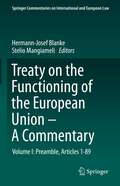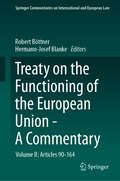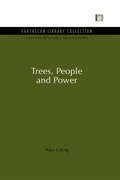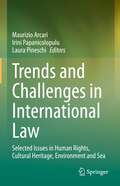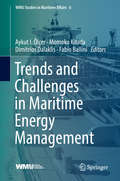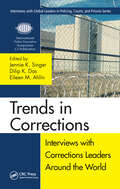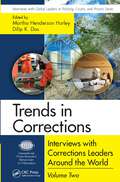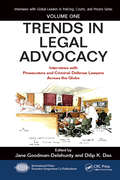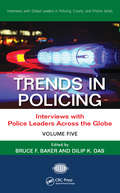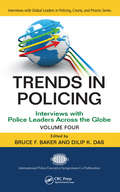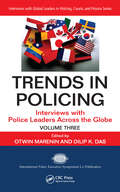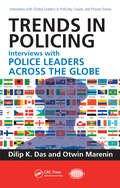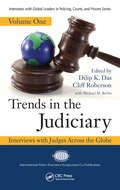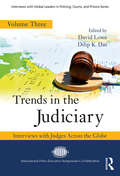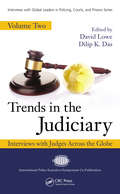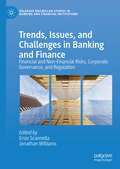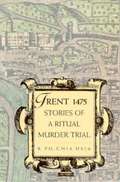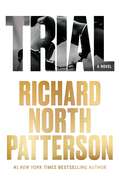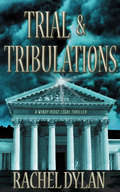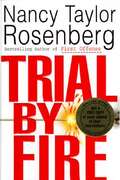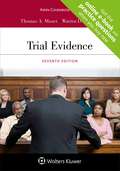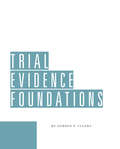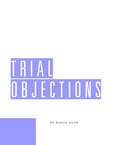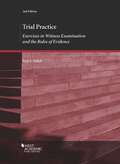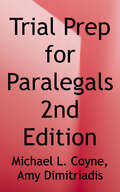- Table View
- List View
Treaty on the Functioning of the European Union - A Commentary: Volume I: Preamble, Articles 1-89 (Springer Commentaries on International and European Law)
by Stelio Mangiameli Hermann-Josef BlankeThe Commentary on the Treaty on the Functioning of the European Union (four volumes) is a major European project that aims to contribute to the development of ever closer conceptual and dogmatic standpoints with regard to the creation of “Europeanised research on Union law”. Following on from the Commentary on the Treaty of the European Union, this book presents detailed explanations, article by article, of all the provisions of the TFEU, discussing the application of Union law in the national legal orders and its interpretation by the Court of Justice of the EU. The authors are academics and practitioners from twenty-eight European states and different legal fields, some from a constitutional law background, others experts in the field of international law and EU law.Reflecting the various approaches to European legal culture, this book promotes a system concept of European Union law toward more unity notwithstanding its rich diversity grounded in national traditions.
Treaty on the Functioning of the European Union - A Commentary: Volume II: Articles 90-164 (Springer Commentaries on International and European Law)
by Hermann-Josef Blanke Robert BöttnerThe Commentary on the Treaty on the Functioning of the European Union (four volumes) is a major European project that aims to contribute to the development of ever closer conceptual and dogmatic standpoints with regard to the creation of “Europeanised research on Union law”. Following on from the Commentary on the Treaty on European Union, this book presents detailed explanations, article by article, of all the provisions of the TFEU, discussing the application of Union law in the national legal orders and its interpretation by the Court of Justice of the EU. The authors are academics and practitioners from all across Europe and different legal traditions, some from a constitutional law background, others experts in the field of international law and EU law. Reflecting the various approaches to European legal culture, this book promotes a system concept of European Union law toward more unity notwithstanding its rich diversity grounded in national traditions.
Trees, People and Power: Trees, People And Power (Natural Resource Management Set)
by Peter UttingBehind the headlines about the loss of tropical forests in Latin America lies a complex and fascinating story of the social pressures which cause it. Trees, People and Power looks at the various groups, interests and conflicts involved, and explores the repercussions for forestry, the environment and the livelihoods of the rural and urban poor. Until the social and political dimensions of deforestation and forest protection schemes are understood, measures to prevent or slow deforestation are likely to involve technical interventions which will prove ineffective in the long run, and may well result in further impoverishment and environmental degradation. Peter Utting takes a critical look at the experience of forest protection and tree planting in a number of countries and considers how social and political factors affect the feasability of such schemes. Many environmental projects and programmes have failed to balance concerns for the environment with those of human welfare. Until they do, it is unrealistic to expect any significant progress towards sustainable development. Peter Utting is a senior researcher coordinator with the United Nations Research Institute for Social Development. He is the author of Economic Adjustment under the Sandinistas (UNRISD, 1991) and Economic Reform and Third World Socialism (Macmillan, 1992). Originally published in 1993
Trends and Challenges in International Law: Selected Issues in Human Rights, Cultural Heritage, Environment and Sea
by Laura Pineschi Maurizio Arcari Irini PapanicolopuluOver the last century, international law has sought to keep pace with sweeping changes that have revolutionised the international community. It has done so in various ways: by developing new fields, adopting new legal instruments, and including new actors and entities in the international fora. Human rights law and environmental law have emerged to address essential issues raised by civil society. Treaties, judgments and soft law instruments have attempted to fill the gaps in regulation. International organisations, corporations, civil society organisations and individuals have all worked to make and enforce, also by judicial means, legal rules. But is all this sufficient?In an effort to answer this question, the chapters of this volume explore selected emerging issues in the fields of human rights, the environment, cultural heritage and law of the sea. Can state responsibility help to protect the environment? Can protecting human rights be reconciled with national security? Can the UN Security Council address climate change? Is law of the sea still fit for purpose? And how can we balance human rights and the environment, or cultural heritage and law of the sea? The international scholars and experienced practitioners who have contributed to this volume discuss these and other key questions.Given its scope, the book will appeal to researchers and scholars of international law, as well as those specialising in human rights law, environmental law, cultural heritage law, and law of the sea.
Trends and Challenges in Maritime Energy Management (Wmu Studies In Maritime Affairs Ser. #6)
by Momoko Kitada Aykut I. Ölçer Dimitrios Dalaklis Fabio BalliniThis book provides an overview of contemporary trends and challenges in maritime energy management (MEM). Coordinated action is necessary to achieve a low carbon and energy-efficient maritime future, and MEM is the prevailing framework aimed at reducing greenhouse gas emissions resulting from maritime industry activities. The book familiarizes readers with the status quo in the field, and paves the way for finding solutions to perceived challenges. The 34 contributions cover six important aspects: regulatory framework; energy-efficient ship design; energy efficient ship and port operation; economic and social dimensions; alternative fuels and wind-assisted ship propulsion; and marine renewable energy. This pioneering work is intended for researchers and academics as well as practitioners and policymakers involved in this important field.
Trends in Corrections: Interviews with Corrections Leaders Around the World, Volume One (Interviews with Global Leaders in Policing, Courts, and Prisons)
by Dilip K. Das Eileen M. Ahlin Jennie K. SingerOffering rare insiders perspectives, Trends in Corrections: Interviews with Corrections Leaders Around the World is a comprehensive survey of correctional programming and management styles used across nations. Twelve chapters present transcribed interviews of corrections leaders along with a brief portrait of the corrections system in those jurisd
Trends in Corrections: Interviews with Corrections Leaders Around the World, Volume Two (Interviews with Global Leaders in Policing, Courts, and Prisons)
by Dilip K. Das Martha Henderson HurleyThe first volume of the Trends in Corrections: Interviews with Corrections Leaders Around the World series introduced readers to the great diversity that exists cross-culturally in the political, social, and economic context of the correctional system. Presenting transcribed interviews of corrections leaders, it offered a comprehensive survey of co
Trends in Legal Advocacy: Interviews with Prosecutors and Criminal Defense Lawyers Across the Globe, Volume One (Interviews with Global Leaders in Policing, Courts, and Prisons)
by Jane Goodman-Delahunty and Dilip K. DasA new installment of the series of Interviews with Global Leaders in Policing, Courts, and Prisons, this book expands upon the criminal justice coverage of earlier volumes, offering the voices of 14 lawyers from 13 diverse locales, including countries in Africa, North America, South America, Europe, and the Asia-Pacific region. This book is intended for students and others focusing on law and legal studies, policing, psychology and law, criminology, justice studies, public policy, and for all those interested in the front lines of legal change around the world. Featuring versatile chapters perfect for individual use or as part of a collection, this volume offers a personal approach to the legal world for students and experienced professionals.
Trends in Policing: Interviews with Police Leaders Across the Globe, Volume Five (Interviews with Global Leaders in Policing, Courts, and Prisons #1)
by Dilip K. Das Bruce F. BakerTrends in Policing: Interviews with Police Leaders Across the Globe, Volume Five, is based on the premise that police officials have a wealth of experience that can make significant contributions to our understanding of the prospects and problems of policing today. Each chapter consists of an interview with a policing leader that explores their understanding of policing developments and current challenges in their countries and internationally, and examines how they evaluate or interpret these developments.
Trends in Policing: Interviews with Police Leaders Across the Globe, Volume Four (Interviews with Global Leaders in Policing, Courts, and Prisons)
by Dilip K. Das Bruce F. BakerTrends in Policing: Interviews with Police Leaders Across the Globe, Volume Four, is the latest installment in a series of insightful interviews with senior police executives worldwide. The book offers readers an unparalleled insider‘s perspective on police goals, practices, and management in nationwide, regional, and city environments. Conducted b
Trends in Policing: Interviews with Police Leaders Across the Globe, Volume Three (Interviews with Global Leaders in Policing, Courts, and Prisons)
by Dilip K. Das Otwin MareninSeveral years ago, the Trends in Policing series unveiled insiders accounts of how police leaders perceive the work they do. These volumes feature interviews with practitioners who speak candidly about their concerns and opinions. They present their evaluations of programs and philosophies that worked and those that did not, describe their concept
Trends in Policing: Interviews with Police Leaders Across the Globe, Volume Two (Interviews with Global Leaders in Policing, Courts, and Prisons)
by Dilip K. Das Otwin MareninPolice leaders possess a plethora of rich experiences and practical and theoretical knowledge that provides fascinating insights into the current state of policing around the world. While observers opinions of ongoing developments in policing are well known, it is rare to get an insider‘s glimpse of how police leaders themselves assess these advan
Trends in the Judiciary: Interviews with Judges Across the Globe, Volume One (Interviews with Global Leaders in Policing, Courts, and Prisons)
by Cliff Roberson Dilip K. Das Michael M. BerlinU.S. Supreme Court justices are studied publicly, but scant attention is generally paid to the judges who function daily in other courts of the world. Trends in the Judiciary: Interviews with Judges Across the Globe assembles a collection of interviews conducted by international scholars and researchers. It provides an insider‘s perspective of how
Trends in the Judiciary: Interviews with Judges Across the Globe, Volume Three (Interviews with Global Leaders in Policing, Courts, and Prisons)
by David Lowe Dilip K. DasThe third volume in the Interviews with Global Leaders in Policing, Courts, and Prisons series, Trends in the Judiciary: Interviews with Judges Across the Globe, Volume Three provides an insider's view of the judicial system. Offering interviews from judges in Africa, Asia, Australasia, Europe, North America, and the West Indies, this text explores the behind-the-scenes motivations of judges on a global scale, delving into the interviewees opinions on diverse legal systems, the interpretation of legal developments, and current issues in criminal law. Readers of this text will be experience the judicial system from within—the plans, protests, and thought processes of practicing judges. Criminal justice students and practitioners alike will benefit from this unique examination of judges around the world.
Trends in the Judiciary: Interviews with Judges Across the Globe, Volume Two (Interviews with Global Leaders in Policing, Courts, and Prisons)
by David Lowe Dilip K. Das Michael M. BerlinThe term judicial opinion can be a misnomer as rarely are judges true feelings on legal issues and the work they do made available to the public. Judges are constrained when writing decisions to follow the law and leave personal commentary aside. Through a series of revealing interviews, this book gathers empirical data from judges and justices fr
Trends, Issues, and Challenges in Banking and Finance: Financial and Non-Financial Risks, Corporate Governance, and Regulation (Palgrave Macmillan Studies in Banking and Financial Institutions)
by Jonathan Williams Enzo ScannellaThis book covers the current and strategic issues in banking and finance with particular reference to financial and non-financial risks, corporate governance, banking and financial regulation, and the loan market. A compilation of the best papers selected by the Scientific Committee and presented at the “Wolpertinger Annual Conference 2024" at the University of Palermo, Italy, the book presents and discusses theoretical and empirical research, policy issues, and contemporary developments in banking, financial intermediation, and other related topics in the broad field of finance. It will be of interest to scholars, professors, and policymakers in banking and financial services.
Trent 1475: Stories of a Ritual Murder Trial
by R. Po-chia HsiaOn Easter Sunday 1475, a dead child was found in the cellar of a Jewish family's house in Trent, Italy. Eighteen Jewish men and one Jewish woman were charged with ritual murder. The author reconstructs the events of this tragic persecution.
Trial
by Richard North PattersonTrial confirms Richard North Patterson&’s place as &“our most important author of popular fiction.&”In a propulsive narrative that culminates in a nationally televised murder case, Trial explores America&’s most incendiary flashpoints of race. A Black eighteen-year-old voting rights worker, Malcolm Hill, is stopped by a white sheriff&’s deputy on a dark country road in rural Georgia. His single mother, Allie, America&’s leading voting rights advocate, restlessly awaits his return before police inform her that Malcolm has been arrested for murder. In Washington D.C., the rising, young, white congressman Chase Brevard of Massachusetts is watching the morning news with his girlfriend, only to find his life transformed in a single moment by the appearance of Malcolm&’s photograph. Suddenly all three are enveloped in a media firestorm that threatens their lives—especially Malcolm&’s.
Trial & Tribulations (A\windy Ridge Legal Thriller Ser. #1)
by Rachel DylanA Windy Ridge Legal Thriller #1 High-powered attorney Olivia Murray faces the biggest test of her career when she is assigned to represent Astral Tech, a New Age tech company, in a lawsuit filed by its biggest competitor. While Olivia is accustomed to hard fights in the courtroom, she arrives in Windy Ridge and discovers there is much more to this case than the legal claims--forces of darkness are at work. Windy Ridge quickly turns from quiet Chicago suburb to spiritual battleground, and Olivia must rely on her faith to defend against legal and spiritual attacks. Although they are enemies in the courtroom, Olivia finds a friend and unlikely ally in opposing counsel, Grant Baxter. Once a skeptic about faith, he ultimately comes to her aid when she needs it most. The battle between evil forces heats up in and out of the courtroom, pushing Olivia to the breaking point. Will she be able to help good triumph over evil, or will the town of Windy Ridge be torn apart?
Trial By Fire
by Nancy Taylor RosenbergThe labyrinth of the law, the dark secrets of the human heart, together with the forces of lust, greed, ambition, and power combine to give us a breathless page-turning thriller set in Texas.
Trial Evidence (Aspen Coursebook)
by Thomas A. Mauet Warren D. WolfsonWell-known and experienced authors, highly respected in the clinical field, Thomas A. Mauet and Warren D. Wolfson provide a complete review of the effective use of evidence in a trial setting. Trial Evidence, Seventh Edition is structured around the way judges and trial lawyers think about evidentiary rules, with particular focus on the Federal Rules of Evidence. Abundant real-life courtroom vignettes illustrate how evidentiary issues arise, both before and during a trial. Logical content organization follows the sequence of a trial: opening statement, direct examination, cross examination, and closing arguments. “Law and Practice” sections throughout the book are based on actual federal and state cases and bring decades of practical experience into the evidence classroom. The accessible style of Trial Evidence always focuses on practice over theory, on applying the statute rather than reading it.
Trial Evidence Foundations
by John Tarantino Gordon ClearyRemembering all the elements required to lay a proper foundation can be difficult. Take the simple admission of a letter. First you have to authenticate the document, then demonstrate that it complies with the best evidence rule if its terms are in issue, then show that it is not hearsay if you intend to use its contents. Trial Evidence Foundations is a handy courtroom guide that will keep you from overlooking any required foundational elements, and point out when your opponent has. Gordon P. Cleary and John A. Tarantino's book contains the rule, elements, tactics, and key cases for most foundations, including: Witnesses * Competency * Establishing credibility * Attacking credibility Authentication * Writings * Oral statements * Recordings * Real or physical evidence Hearsay * Admissions * Declarations * Records * Excited utterances Opinion * Lay witnesses * Experts Privileges * Waiver * Specific privileges Designed for use when time is short, the book is formatted for quick reference. Each foundation is tightly covered in three or four pages. 20 sturdy divider tabs, each printed with a foundation category and color-coded, quickly direct you to the correct page. The book is small enough to fit into a trial case and designed to be taken to the courtroom.
Trial Objections
by R. Rogge Dunn Karen Hirschman Michael OropalloMost evidentiary rulings are within the judge's discretion, and are made in seconds. Bad rulings are rarely reversible. As a result, you need to bring all your admissibility ammunition to bear at the moment of objection. Rogge Dunn's Trial Objections increases your firepower with pattern objection language, explanatory comments, tactics for exclusion, arguments for admission, foundational elements, supporting authority, and practice tips for: * Voir dire * Opening statements * Documentary evidence * Demonstrative evidence * Hearsay evidence * Attorney misconduct * Examination of witnesses * Privileges * Closing arguments * And much more! Trial Objections explains when and how to make and meet objections more successfully. This quick-reference book covers the full range of objections, complete with more than 110 pattern objections, tactics, forms, suggested responses, necessary foundations, and hundreds of state and federal cases. It also includes a handy quick reference guide.
Trial Practice: Exercises in Witness Examination and the Rules of Evidence (Coursebook)
by Paul MilichTrial Practice: Exercises in Witness Examination and the Rules of Evidence is a remarkable set of exercises designed for Trial Advocacy courses. This new edition adds coverage of electronic evidence and confrontation clause issues. With special attention paid to the Rules of Evidence, these classroom simulations aim to cultivate students’ skills at witness examination and arguing evidence objections and motions. The text, written in workbook format, contains 35 civil and criminal trial simulations that allow students and professors to see marked improvement in trial skills throughout the course. The hands-on format thoroughly engages students in the subject matter while teaching them practical skills required in legal practice. The comprehensive Teacher’s Manual provides everything necessary to make the class teachable, requiring minimal preparation time from the instructor.
Trial Prep for Paralegals: Effective Case Management and Support to Attorneys in Preparation for Trial (Nita Ser.)
by Michael L. Coyne Amy DimitriadisCoyne and Furi-Perry have created the essential how-to guide for trial preparation. Paralegals will master every stage of litigation, from initial client interviews to pulling together the trial notebook. The book begins with overviews of the litigation process and the evidence rules. Practical skills for interviewing, handling discovery, preparing exhibits, and more are then introduced and explained with examples. Finally, the book stresses the importance of communication and working well with attorneys, clients, courts, and others.
